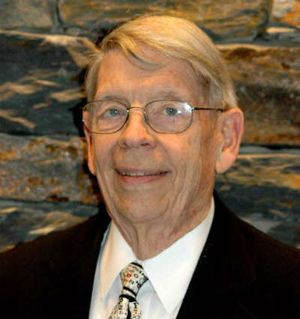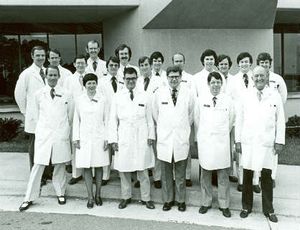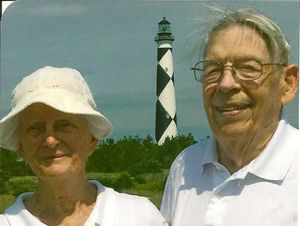If you have read the Scope newsletter for the past decade or so, you have most likely been delighted by the regular contributions of our colleague, W. Banks Anderson Jr., MD. With his inquisitive mind and encyclopedic fund of knowledge, not to mention a perceptive sense of humor, he has regaled us with an eclectic range of erudite discussions.

Dr. Anderson covered subjects such as the advantages of LED lighting, including for our personal safety (“LED Light”); the physics and value of blinders on race horses (“Mud in the Eye,” published online as Why Horses Wear Blinders); how a World War II pilot and inventor became the model for Ian Fleming’s James Bond series (“SpEye in the Sky”); the importance of pupillary size in various mammals (“Light Buckets”); and the role his home town of Durham, N. C., played in the conclusion of the Civil War (“Endings North and South”).
He also wrote several tongue-in-cheek essays, such as the application of ophthalmic surgical skills to remove nasal hair (“Ectoderm”), the perils of bamboo (“Bamboozled”), treating frozen eye lashes with a hot shower (“Cryostichiasis”) and avoiding abrasions from seams in clothing (“The Seamy Side”).
Those of us who have had the pleasure of knowing Dr. Anderson personally should not be surprised that he amassed such a collection of wide-ranging articles, since his entire life has been characterized by a diverse span of interests, talents and accomplishments.
Dr. Anderson grew up in Durham, where his father was an ophthalmologist and chief of ophthalmology at the Duke University Medical Center. In 1946, he left his hometown for the cold northeast and a decade of distinguished education, including Phillips Exeter Academy in New Hampshire; Princeton University, where he graduated magna cum laude and played on the varsity lacrosse team that won the national championship; and then medical school at Harvard University. He returned home long enough for an internship at Duke, after which he went back north to serve in the army, first at Walter Reed Army Medical Center in Washington, D.C., and then for a tour of duty at the army hospital in Munich, Germany, where he ran the eye, ear, nose and throat service.
In 1959, Dr. Anderson returned home to Durham for good. He completed his residency in ophthalmology at Duke, then joined the faculty, where he practiced and taught until his retirement in 2006. As a Duke resident in the early 1970s, I immediately became aware of what an invaluable resource Dr. Anderson was as a mentor.

1980's - Duke University Department of Ophthalmology
Every Saturday morning, he would conduct a teaching session with the residents, which was the highlight of our didactic training. On Friday evenings, he would ask the chief resident to suggest a topic on any subject in ophthalmology (and sometimes even beyond our specialty). The next morning, he would lead us in the most comprehensive and up-to-date discussion on that topic. He was truly the complete ophthalmologist as a clinician, surgeon and educator.
Early in his residency years, Dr. Anderson met a lovely young nursing student by the name of Nancy Walker of Port Washington, N.Y. They married in 1960 and would raise three children, Mary Banks, Mark and Beth, each of whom have gone on to have successful lives and families. In addition to many grandchildren, Banks and Nancy have recently become great grandparents.

Dr. Anderson and his wife Nancy
Along with a distinguished medical career and a devoted family, Dr. Anderson has been dedicated to the service of our profession. In addition to serving as president of the North Carolina Society of Ophthalmology and the ear, eye, nose and throat section of the North Carolina Medical Society, he has been chair of the Residency Review Committee for Ophthalmology, president of the American Ophthalmological Society and a director of the American Board of Ophthalmology and the American Academy of Ophthalmology. He also served as vice-chairman of the Duke department of ophthalmology for nearly a quarter century and was the acting chairman in 1991 and 1992.
But there is more. Dr. Anderson is also a licensed amateur radio operator; an artist, with excellent oil paintings to his credit; and an accomplished violinist, a pleasure that he continues to enjoy with colleagues, including the Durham Medical Orchestra. In one of his Scope articles, entitled “The Typewriter,” (published online as The Typewriter's Rat-a-Tat-a-Tat-Pling!) he describes an orchestral piece of the same name by Leroy Anderson and then looks back nostalgically on that mechanical contraption, which inspired the piece and of which we seniors undoubtedly have our own memories, fond or otherwise.
And so, Dr. Anderson, through his eclectic interests and talents, has made major contributions to our profession, the patients he served, the students he taught, the family he and Nancy raised and to you and me, his colleagues, whose lives he has enriched in so many ways, including his articles in Scope.
Sadly, Dr. Anderson has now elected to step down from his position as associate editor and regular contributor to the newsletter, but he and Nancy remain very active in their current life at The Forest at Duke. There, not surprisingly, Dr. Anderson serves on numerous committees and they both continue to enjoy life with family and friends and the new interests and experiences that each day brings.